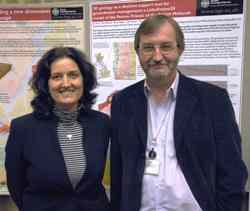
Katherine Royse and Diarmad Campbell* wonder if we are doing enough to ensure geoscience reaches policymakers
Geoscientist 19.1 January 2009
In recent years we have seen a growing number of environmental crises, both in the UK and overseas. Near to home, the most extreme and obvious example was the summer flooding of 2007. Such events, coupled with the impact of the Stern Review in 2006
1, have placed geosciences at the forefront of policy making. It is now up to us, as geoscientists, to ensure, that the express aim of the UN International Year of Planet Earth becomes reality, and that henceforth government policy is effectively underpinned by Earth science information and knowledge.
This is no less than a moral obligation in any case. in the UK, peer review alone costs around £165m per annum
2, and our research is, after all, largely Government funded – which is to say, society-funded. So, are we as a community actively engaging with policymakers and getting our message across as well as we should?
Peer-reviewed publications will continue to be an important measure of the quality of our work - but they are tailored to highly specialised audiences, and speak in a tongue that is all their own. It is often hard enough for geoscientists to understand one another, without expecting policymakers to identify, unaided, the inherent relevance of our vast literature.
So, first of all we need to understand how and where policymakers get their information. We can then channel our information and knowledge more effectively. Speaking and listening to policymakers at recent ISSUES seminars
3 it has become clear to us that they do not get it direct from Nature or any other peer-reviewed journals. They, like many of us, chiefly consult search engines such as Google, and relevant trade journals and magazines such as Planning, Surveyor and, in theory at least, Geoscientist.
If these are the research sources of choice for policymakers, and as more journals become available electronically, we surely have to pay much greater attention to the titles and abstracts of our papers (see Tony Bazley’s recent Soapbox on this
4). Policymakers need to be able to identify the potential relevance in our work. If it is not clear either from the title or the abstract, then the paper is never going to be noticed among the scores published every week.
Since many policymakers read trade journals and magazines in their specialist area, it makes sense that we rewrite potentially relevant papers specifically for these outlets or even release a summary version on their websites. This is not ‘dumbing-down’ – it is a recognition of reality. It will take just a few hours, and if done by all, will greatly increase the impact of geoscience in policy making in the UK and possibly beyond.
It may even result in better policy making in the future.
References
- Stern Review on the Economics of Climate Change, HM Treasury, 2006. http://www.occ.gov.uk/activities/stern.htm
- Times Higher Education Supplement, 29 May 2008
- ISSUES: Integrating Sciences to Sustain Urban Ecosystem Services. Transdisciplinary Seminar Series. Supported by ESRC/NERC/EPSRC
- Bazley, Tony 2008: Abstract Art. Geoscientist 18.11 November 2008 p3)
Editor writes: As though by editorial design, this issue carries an excellent example of just the sort of interpretative popular article about research with profound policy implications that Royse and Campbell urge academics to write more often.
*British Geological Survey